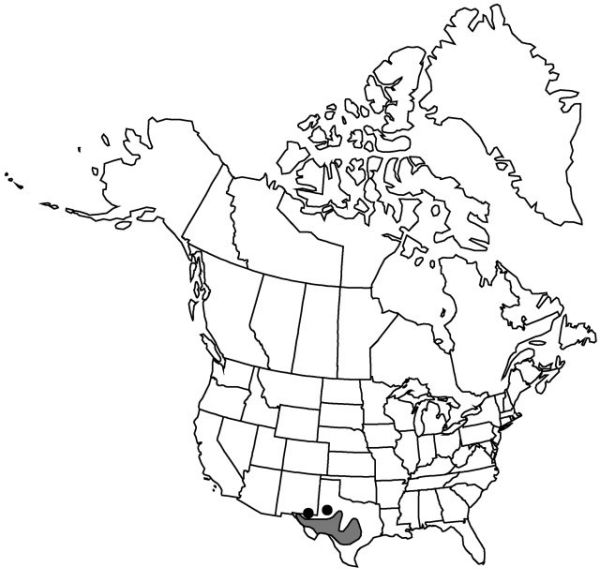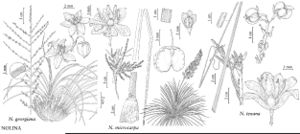Nolina texana
Proc. Amer. Acad. Arts 14: 248. 1879.
Plants acaulescent, cespitose; rosettes from vertical, subterranean branched caudices. Leaf-blades wiry, stiff, triangular, slightly concavo-convex toward base, 40–90 cm × 2–4 (–7) mm, not glaucous; margins entire, rarely remotely serrate with widely separated, noncartilaginous teeth, tips dying; inflorescence leaf-blades curling distally, 10–50 cm. Scape curling distally, 0.5–2 dm. Inflorescences paniculate, rarely purple, 2.5–7 dm × 5–17 cm, held completely or partially within rosettes; main rachis and divisions thick, rigid, lateral branches ascending; bracts persistent, to 10–40 cm; bractlets laciniate, 1–2 mm. Flowers: tepals yellow-green, 2.5–3.5 mm; fertile stamens: filaments 0.9–1.4 mm, anthers 0.8–1 mm; infertile stamens: filaments 0.6–0.8 mm, anthers 0.4–0.5 mm; fruiting pedicel ascending, thick, articulate near base, noticeably dilated into perianth, proximal to joint 2.5–6 mm, distal to joint 1.5–2 mm. Capsules thin-walled, inflated, 3–4 × 4.5–5.5 (–8) mm. Seeds closely invested in capsules, rounded, bursting ovary walls, 2.6–3.4 mm diam. 2n = 38.
Phenology: Flowering late winter–early spring.
Habitat: Rocky hillsides, limestone, granite, grasslands, shrublands
Elevation: 200–2000 m
Distribution

N.Mex., Tex., n Mexico
Discussion
Nolina texana is centered primarily on the Edwards Plateau west through the trans-Pecos region of Texas. Nolina texana var. compacta is not recognized as distinct from var. texana. They have the same distributions. Variety compacta has compact inflorescences with functionally pistillate flowers, which is typical of the functionally pistillate plants of var. texana. Those plants with elongate secondary branches have functionally staminate flowers and are characteristic of both varieties. The dark, round seeds are quite distinct in the open fruit chambers on inflorescences hidden within the basal leaves. Some plants from the high plains of eastern New Mexico, northwestern Oklahoma, and southern Colorado were considered to be N. texana (see 7. N. greenei). Further study of these populations may help determine if they truly are a part of this complex.
Selected References
None.
Lower Taxa
"thick" is not a number. "thin" is not a number."dm" is not declared as a valid unit of measurement for this property."dm" is not declared as a valid unit of measurement for this property. "dm" is not declared as a valid unit of measurement for this property."dm" is not declared as a valid unit of measurement for this property."thick" is not a number."dm" is not declared as a valid unit of measurement for this property.
